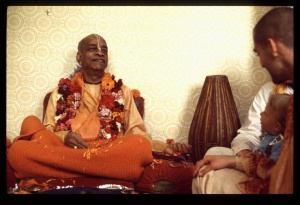SB 3.8.6: Difference between revisions
m (1 revision(s)) |
No edit summary |
||
| Line 1: | Line 1: | ||
{{info | {{info | ||
|speaker=Maitreya | |speaker=Maitreya Ṛṣi | ||
|listener=Vidura | |listener=Vidura | ||
}} | }} | ||
[[Category:Srimad-Bhagavatam - Canto 03 Chapter 08|S06]] | |||
[[Category:Bhagavatam Verses Spoken by Maitreya Rsi - Vanisource|030806]] | |||
<div style="float:left">'''[[Srimad-Bhagavatam]] - [[SB 3|Third Canto]] - [[SB 3.8: Manifestation of Brahma from Garbhodakasayi Visnu|Chapter 8: Manifestation of Brahmā from Garbhodakaśāyī Viṣṇu]]'''</div> | |||
<div style="float:right">[[File:Go-previous.png|link=SB 3.8.5]] '''[[SB 3.8.5]] - [[SB 3.8.7]]''' [[File:Go-next.png|link=SB 3.8.7]]</div> | |||
{{RandomImage}} | |||
==== TEXT 6 ==== | ==== TEXT 6 ==== | ||
<div | <div class="verse"> | ||
muhur gṛṇanto vacasānurāga- | :muhur gṛṇanto vacasānurāga- | ||
skhalat-padenāsya kṛtāni taj-jñāḥ | :skhalat-padenāsya kṛtāni taj-jñāḥ | ||
kirīṭa-sāhasra-maṇi-praveka- | :kirīṭa-sāhasra-maṇi-praveka- | ||
pradyotitoddāma-phaṇā-sahasram | :pradyotitoddāma-phaṇā-sahasram | ||
</div> | </div> | ||
| Line 16: | Line 22: | ||
==== SYNONYMS ==== | ==== SYNONYMS ==== | ||
<div | <div class="synonyms"> | ||
''muhuḥ''—again and again; ''gṛṇantaḥ''—glorifying; ''vacasā''—by words; ''anurāga''—with great affection; ''skhalat-padena''—with symmetrical rhythm; ''asya''—of the Lord; ''kṛtāni''—activities; ''tat-jñāḥ''—those who know the pastimes; ''kirīṭa''—helmets; ''sāhasra''—thousands; ''maṇi-praveka''—glowing effulgence of the valuable stones; ''pradyotita''—emanating from; ''uddāma''—raised; ''phaṇā''—hoods; ''sahasram''—thousands. | |||
</div> | </div> | ||
| Line 23: | Line 29: | ||
==== TRANSLATION ==== | ==== TRANSLATION ==== | ||
<div | <div class="translation"> | ||
The four Kumāras, headed by Sanat-kumāra, who all knew the transcendental pastimes of the Lord, glorified the Lord in rhythmic accents with selected words full of affection and love. At that time Lord Saṅkarṣaṇa, with His thousands of raised hoods, began to radiate an effulgence from the glowing stones on His head. | The four Kumāras, headed by Sanat-kumāra, who all knew the transcendental pastimes of the Lord, glorified the Lord in rhythmic accents with selected words full of affection and love. At that time Lord Saṅkarṣaṇa, with His thousands of raised hoods, began to radiate an effulgence from the glowing stones on His head. | ||
</div> | </div> | ||
| Line 30: | Line 36: | ||
==== PURPORT ==== | ==== PURPORT ==== | ||
<div | <div class="purport"> | ||
The Lord is sometimes addressed as uttamaśloka, which means "one who is worshiped with selected words by devotees." A profusion of such selected words comes from a devotee who is fully absorbed in affection and love for the devotional service of the Lord. There are many instances in which even a small boy who was a great devotee of the Lord could offer excellent prayers in the choicest words for glorification of the pastimes of the Lord. In other words, without the development of fine affection and love, one cannot offer prayers to the Lord very suitably. | The Lord is sometimes addressed as ''uttamaśloka'', which means "one who is worshiped with selected words by devotees." A profusion of such selected words comes from a devotee who is fully absorbed in affection and love for the devotional service of the Lord. There are many instances in which even a small boy who was a great devotee of the Lord could offer excellent prayers in the choicest words for glorification of the pastimes of the Lord. In other words, without the development of fine affection and love, one cannot offer prayers to the Lord very suitably. | ||
</div> | </div> | ||
__NOTOC__ | |||
<div style="float:right; clear:both;">[[File:Go-previous.png|link=SB 3.8.5]] '''[[SB 3.8.5]] - [[SB 3.8.7]]''' [[File:Go-next.png|link=SB 3.8.7]]</div> | |||
__NOTOC__ | |||
__NOEDITSECTION__ | |||
Revision as of 13:49, 4 May 2021

A.C. Bhaktivedanta Swami Prabhupada
TEXT 6
- muhur gṛṇanto vacasānurāga-
- skhalat-padenāsya kṛtāni taj-jñāḥ
- kirīṭa-sāhasra-maṇi-praveka-
- pradyotitoddāma-phaṇā-sahasram
SYNONYMS
muhuḥ—again and again; gṛṇantaḥ—glorifying; vacasā—by words; anurāga—with great affection; skhalat-padena—with symmetrical rhythm; asya—of the Lord; kṛtāni—activities; tat-jñāḥ—those who know the pastimes; kirīṭa—helmets; sāhasra—thousands; maṇi-praveka—glowing effulgence of the valuable stones; pradyotita—emanating from; uddāma—raised; phaṇā—hoods; sahasram—thousands.
TRANSLATION
The four Kumāras, headed by Sanat-kumāra, who all knew the transcendental pastimes of the Lord, glorified the Lord in rhythmic accents with selected words full of affection and love. At that time Lord Saṅkarṣaṇa, with His thousands of raised hoods, began to radiate an effulgence from the glowing stones on His head.
PURPORT
The Lord is sometimes addressed as uttamaśloka, which means "one who is worshiped with selected words by devotees." A profusion of such selected words comes from a devotee who is fully absorbed in affection and love for the devotional service of the Lord. There are many instances in which even a small boy who was a great devotee of the Lord could offer excellent prayers in the choicest words for glorification of the pastimes of the Lord. In other words, without the development of fine affection and love, one cannot offer prayers to the Lord very suitably.